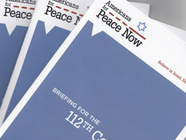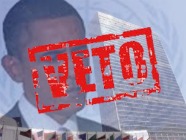FOR
IMMEDIATE RELEASE
February 18,
2011
CONTACT:
Ori Nir
(202) 408-9898
onir@peacenow.org
Settlements
Resolution Veto: Missed Opportunity for U.S. Leadership
Washington,
DC - Americans for Peace Now (APN) today expressed disappointment at the Obama
administration's veto of a UN Security Council resolution supporting the peace
process and the two-state solution and condemning Israeli settlement activity
in the West Bank and East Jerusalem.
Reacting to the US veto, APN's President and CEO Debra DeLee said: "President
Barack Obama missed a key opportunity today to demonstrate U.S. leadership on
peace. America's failure to hold both sides accountable for their actions is a
contributing factor to the state of the peace process today. When America
doesn't lead, developments take on a momentum of their own.
"We
are dismayed that America, Israel, the Palestinians, and all stakeholders in
Mideast peace have reached this painful and utterly avoidable moment. We would
not be here today if Israel's Netanyahu government had stopped settlement
construction in the West Bank and East Jerusalem, as the Obama Administration
begged Israel to do. And we would not be here today if President Obama had
matched his policy to his rhetoric during his first two years in office.
"What
happened today is not just about an American veto of a resolution that is
consistent with longstanding U.S. policy. The fact that the Palestinians went
ahead and brought the resolution to a vote demonstrates the degree to which the
Palestinians and the international community have lost faith in the peace
process, and in U.S. leadership of that process.
"This
should be a wake-up call to the administration. For the sake of Israel and for
the sake of U.S. interests in the region and beyond, President Obama must take
dramatic action to restore faith in the peace process and in America's
leadership of that process. It is not too late for the Obama administration to
show real leadership, to push both sides to negotiate peace in earnest, to show
the parties that intransigence comes at a price, and to submit bridging
proposals or even its own plan for a final settlement of the conflict.











